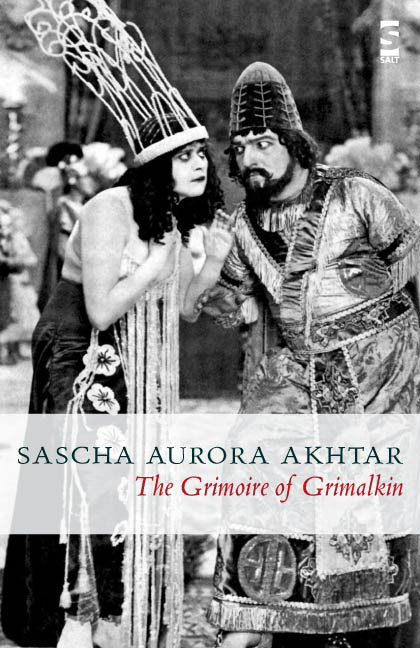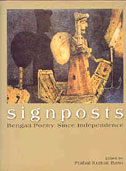 An international poetry book review series
An international poetry book review series
Series Editor:: Aryanil Mukherjee
|
The Grimoire of Grimalkin
Sascha Aurora Akhtar
William Allegrezza
If you like Deleuze and Guttari’s rhizomes, medieval European divination/magic, obscure literary references, linguistic mayhem, and poetry, then Sascha Aurora Akhtar’s The Grimoire of Grimalkin is the book for you. In the best sense, the book leads the reader on a wild ride along language’s edges. The title, perhaps, prepares us for this ride, for after all, a grimoire is a medieval book of magic, one that often tells how to conjure demonic figures. As its word roots suggest, a grimoire is a grammar of magic. Taken in this view, Akhtar’s book either conjures some force through obscure language or provides us with a structure for understanding alternate worldviews. Add in Grimalkin, and we see this alternate worldview will be something demonic, perhaps underground, for while Grimalkin might best be remembered by modern readers as the cat from Shakespeare’s Macbeth, the grimalkin has a longer history tied into being known as a devil cat (grimalkin literally mean gray demon). The title alone prepares us for an unusual poetry collection, and the rest of the book does not fail to match up.
This collection purposefully tries to confound meaning as understood through language, and that makes reviewing it difficult. Ahktar takes familiar language and puts it in interesting new contexts, pushing the reader to question whether or not she has a meaning in mind for the text, whether or not any texts have meaning, whether or not the text works on radiating vectors and allusions that need to be deciphered, or whether or not the reader is just supposed to listen to the sounds evoked. Whatever the reader decides, it’s clear that Akhtar has a sharp grasp of language and linguistic play, for at times she leads us through one line only to push us into a completely different line, and at other times she throws sound at us. Take, for example, these two selections, one from “Enueg” and one from “Foul Play”:
Nothing will happen
no one will frame it
for posterity, regress
a summons keen & crisp
to get your attention, fraternize
with the neighbors.
and
Sorry stitches saving nine & a half dames
& nits from a fate more dull than dire
Typical of many of the poems, the selection from “Enueg” starts off with what seems narrative but then quickly strays from it. It makes one reread to see if one has wandered off track or if one has misread/created in a search for meaning, and since its title is also a poetic form crafted by the troubadours, the reader is compelled to search for connections to other enuegs. Also typical, the selection from “Foul Play” is hard to comprehend in terms of meaning, but it’s full of sound, of s’s, n’s, d’s, a’s, of repeating sounds as in a song. With poems like this one, giving up on the search for meaning to listen to the language is easier. A reader can read for sound and brilliant language.
The Grimoire of Grimalkin is filled with exciting combination of words and with a variety of language that makes it interesting to read. Akhtar is a poet with a wide range of poetic and historical knowledge, and she combines it well in this strange but fascinating book.
The Grimoire of Grimalkin. Sascha Aurora Akhtar.Cambridge: Salt, 2007.


|
William Allegrezza is a hiker, sailor, poet, teacher, and musician. He is a Ph.D. in Comparative Literature from LSU currently teaching at Indiana University Northwest. His main interests are contemporary poetry, especially the Language Poets and the experimental poetic tradition. Bill edits Moria Poetry, an experimental poetry e-zine. He is also the editor-in-chief of Cracked Slab Books. His poetry, essays and translations have appeared in literary journals published in many countries, including Australia, Italy, Czech Republic, Finland, Netherlands etc.
|
|
|
BOOKS
|

The Grimoire of Grimalkin
|
|

Poems from Guantánamo
The Detainees Speak
|
|

SIGNPOSTS
A Bengali Poetry Collection |
|
|




